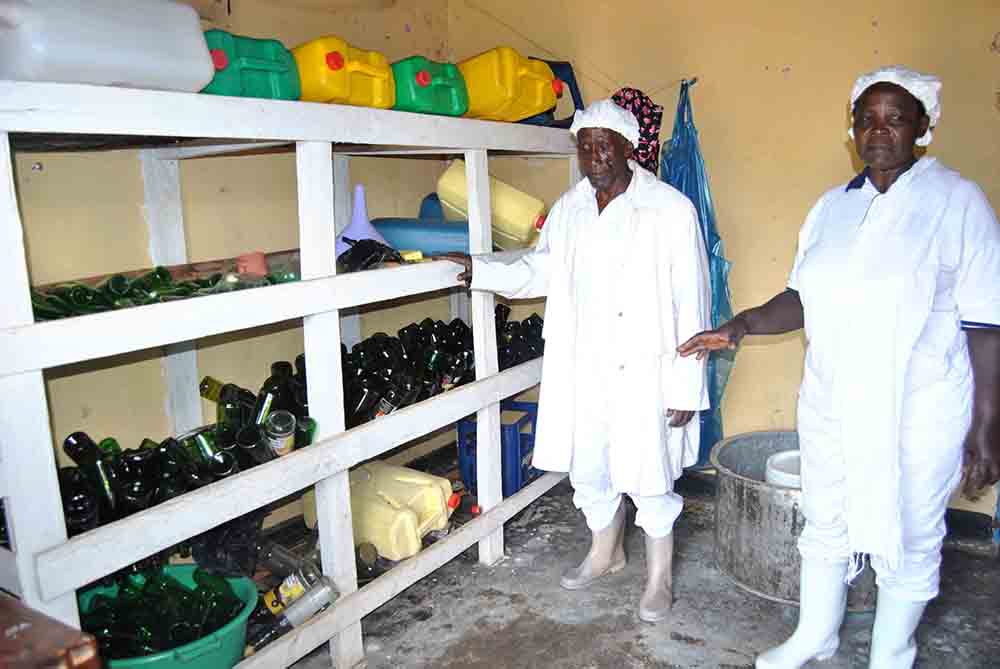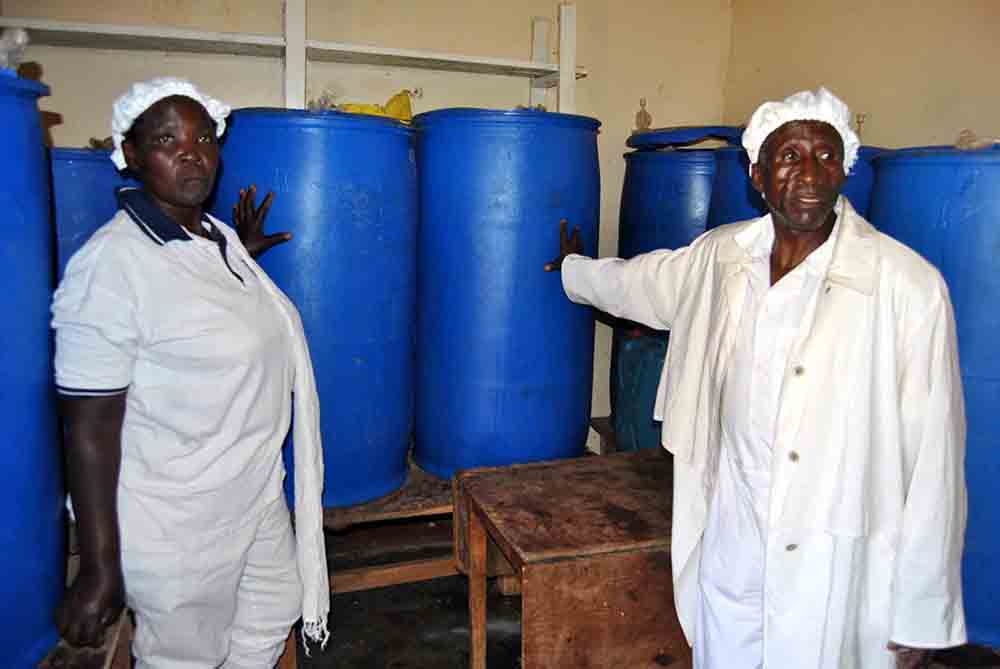When Lt Edward Ssebuwufu retired from the army in 1993, he had one thing on his mind as he retreated to his village home in Nzu village, Namayumba sub-county, Wakiso district. He wanted to be a farmer.
Ssebuwufu had joined the then National Resistance Army (NRA) guerrillas in Luwero in 1982. He served as a fighter throughout the war until he retired in 1993.
However, as he left the army for civilian life, he did not realise that his and his wife’s hands would later produce a beverage that would entice the country’s throats. Today, his Global Wine brand is a household name in Wakiso and Kampala. His cellar, at Nzu village, Namayumba maintains around 5,000 litres of mature pineapple wine.
How he started
When Ssebuwufu returned home, he planted bananas and coffee.
“I planted bananas because they create a sense of food security, as well as coffee because it is a cash crop,” he says.
While still engaged in subsistence farming, the couple received training in growing fruits in 1999.
“We were trained by some groups to grow fruits especially oranges, mangoes, passion fruits and pineapples,” Ssebuwufu says.
In addition to these, he also planted bananas and coffee on his farm. With a zero-grazing dairy cow giving the couple at least 18 litres of milk per day, their household income seemed to have been taken care of. The couple got the heifer from Heifer International.
“But then, after sometime, the fruits that we were growing started rotting on the farm. We did not have a good market for them,” Racheal Nsangi, Ssebuwufu’s wife says. The couple then sought for knowledge of turning some of the fruits into juice.
The couple were then trained by the Agency for Integrated Rural Development (AFIRD) into adding value to their fruits. Among the knowledge and skills they received included processing wines, juice and jam from fruits. The group that was trained around Namayumba had over 25 people in all. However, only Ssebuwufu and his wife took up value addition.
“In 2005, we started processing juice concentrate from passion fruits and jam from pineapples,” he says. He says that further trainings organised by PELUM helped enhance their knowledge and exposure in juice and wine processing. The couple produces wine from only organically produced fruits.
“We use organic fruits because we believe in respecting nature,” Ssebuwufu says.
The beginning was not as rosy and big as Global Wine looks today. “We started with ordinary saucepans for boiling the juice and jerrycans for storage and fermentation,” Nsangi recalls. The initial capital was about sh50,000, mainly used to buy the saucepans and jerrycans and airtight cocks. They also bought funnels for distilling the wine-each costing sh15,000.
Because they had been properly trained, the wine that came out of that rudimentary process was good. “Through all this, we visited other people processing wine and learnt from them. We also attended farmers shows, organised both nationally, for example in Jinja and others organised by organic farmer groups like NOGAMU and PELUM,” she says.
Expanding the machinery
Gradually, in 2009, the couple improved from using jerrycans to using 250-litre drums. The drums were equipped with airtight covers. “We bought the first drum at sh80,000 from Kampala,” Nsangi says.
Since then, they have added another 11 drums to make 12 in all. At sh80,000 each, this means that they spent sh960,000 on the drums alone. “The advantage is that they give us a bigger capacity to ferment and store wine,” Ssebuwufu says.
In addition to the drums, the couple also acquired a juice press, which is used for extracting juice from the fruits, a capping machine at a cost of sh150,000. This is used for putting metallic caps on the bottles and then a cap sealing machine that helps seal the bottles.
The couple source their wine bottles from second-hand wine bottle dealers in Kisenyi and Katwe in Kampala.
“When we buy the bottles and bring them here, we boil and sterilise them so that they are completely free of germs,” Nsangi says.

How they process wine
“If you want to produce a good product and maintain a good clientiele, make sure that you are very clean,” Nsangi says. Indeed, when one visits Global wines, the first impression is of a very clean processing area. Both Ssebuwufu and Nsangi put on clean white overalls, complete with white gumboots. Any person who wants to enter the processing area is also given an overall and gumboots.
The couple uses both fruits from their own farm and those bought from other farmers in the area.
“We buy pineapples at between sh1,000-sh1,500 each from farmers,” he says. He explains that this is a good price for the farmers, given the other market prices. For every 10 medium-sized pineapples, Global Wine produces about 20 litres of wine.
When the fruits arrive from the farms, they are received in a separate room that has got a sorting table.
“We examine the fruits for any damages. We then cut them to pieces using clean knives,” Nsangi explains. Cleaning the knives entails boiling and sterilising them.
Later, the fruit pieces are put in a juice press that squeezes juice out of them. The juice is then put in a boiler, where it is boiled and then put in a fermenter (they use drums), where it is kept for at least 3months before it turns into fine wine.
Production
Unlike juice, wine takes much longer to prepare. However, according to Ssebuwufu, they produce around 15,000 litres of wine per year. At an average price of sh10,000 per litre, this means that their production value is worthy sh150m.
“Sometimes we keep wine here for over a year. Of course the longer it is kept, the better it gets,” Nsangi says.
Nsangi and her husband do most of the work at the winery. Their children are the other recorded employees of the business. This helps them cut costs that would ideally have gone to other workers.
Market
Global Wine’s market runs across the country.
“A good product will always find market for itself,” says Ssebuwufu.
But then, how does one know that this is a good product unless they taste it? Nsangi says looking for and cementing their market has been gradual.
“When we started, nobody knew about our wine. We had to move around promoting it. But after people have tasted it, they have brought us more customers,” Ssebuwufu says.
Promoting their wine saw them visit and exhibited at various farmers shows, including the annual farmers show in Jinja and others organised by NOGAMU.

Expansion plans
Global wine now looks at setting up a full wine processing plant in Namayumba.
“I am planning to set up a fully-fledged winery at my home,” Ssebuwufu says. At the moment, the winery is located in a family owned commercial building, in Nzo trading centre, about 1km from the family home. However, the couple feels that this is not such a conducive location for a winery.
“There are so many other businesses going on around us and we fear that as they grow, they may affect our business,” he says. Ssebuwufu needs at least sh120m to construct and equip the winery at home.
The Ssebuwufus are also happy that as they age further, their children have learnt the trade and will take it up for continuity.
“We are fully aware that we shall not be here forever, but we do not want our business to die with us. This is why we are fully involving our children to learn it and sustain it,” Nsangi explains. For now, their prayer is that Global Wine fully goes global as the name says.
Lydia Jjemba from Namayumba says: “The couple is an inspiration to many of us here. We are also engaged in some kind of value addition to milk, but we are working together with the Ssebuwufus because some of the equipment that they use, for example the charcoal cooler is the same as we use. The success of such small establishments shows that indeed, value addition can be done at all levels.”





